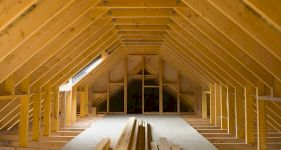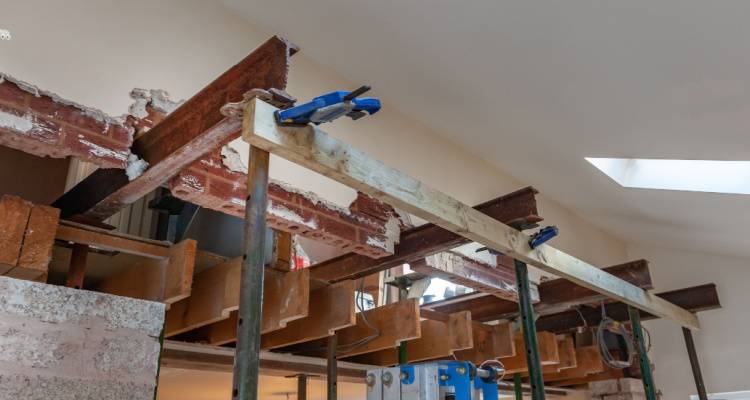Cost of Bathroom Extension
- The average cost of getting your bathroom extended is around £1,300 per sm
- The job will take approximately 5 - 10 weeks to complete
- A complete pricing breakdown which includes cost factors to consider, along with what such a task usually involves
- How long the job should approximately take and a general overview of what kind of jobs can be performed
- How to find and hire a builder
Looking for the cost of building a bathroom extension?
For a basic bathroom extension with just the bare essentials, the average cost will be around £900-£1700 per m2.
But, if you're looking for a top-of-the-range build and finishing, it'll cost around £1750-£2200 per m2.
So, how can this guide help you?
This ultimate price guide can help you calculate exactly how much a bathroom extension will cost you, as there are many factors that can affect the overall cost.
Need to find and hire a builder? Why not request a quote from our range of local builders?
For a more detailed look at bathroom extension costs - read on...

£1,300 per sm
Table of Contents
- How Much is a Bathroom Extension?
- Supply Only Costs
- Additional Costs
- Labour Costs and Timescales
- Cost Factors of a Bathroom Extension
- What's Involved in a Bathroom Extension?
- Can I Build a Bathroom Extension Myself?
- Building Regulations & Planning Permission for a Bathroom Extension
- Benefits of a Bathroom Extension
- Hiring Contractors to Build a Bathroom Extension Checklist
- FAQs
- Sources
How Much is a Bathroom Extension?
When it comes to building a bathroom extension, the final price will depend on a wide range of factors.
These factors can include the size of the extension, the quality of the finish, and your location within the UK.

For a basic bathroom extension with just the bare essentials, the average cost will be around £900-£1700 per m2. If you are looking for a top-of-the-range build and finishing, you will be looking at costs of around £1750-£2200 per m2.
Depending on the type of bathroom products you add to your extension, you may be looking at additional costs of around £2000-£6000.
I'd like to move the bathroom toilet to create more space for a bathroom extension, but that would mean running the soil pipe along the wall for a few metres. Will this be a problem?
Bathroom Extension Prices
Below is an overview of the different bathroom extension costs that you can expect. It's important to note that a double-storey extension is often cheaper than a single storey extension as most of the cost is in the foundations and groundwork.
| Bathroom Extension Type | Average Cost per m2 |
|---|---|
| Basic single storey bathroom extension | £1000-£1700 |
| Average single storey bathroom extension | £1700-£1900 |
| Premium single storey bathroom extension | £1900-£2200 |
| Basic double-storey bathroom extension | £950-£1500 |
| Average double-storey bathroom extension | £1500-£1850 |
| Premium double-storey bathroom extension | £1850-£2200 |
Supply Only Costs
Below is a list of the costs of supplies when it comes to building a bathroom extension. This indicates all of the costs that may come up without the cost of labour:
| Type of Supply | Average Cost |
|---|---|
| Door | £50-£300 |
| Window | £200-£600 |
| Wall décor (paint/tiles/wallpaper) | £20-£50 per m2 |
| Basic flooring | £10-£30 per m2 |
| Average flooring | £30-£60 per m2 |
| Premium flooring | £50-£100 per m2 |
| Radiator | £60-£300 |
| Bath | £80-£500 |
| Shower | £60-£1000 |
| Toilet | £50-£500 |
| Sink | £50-£300 |
| Taps | £50-£100 |
Additional Costs
There are several additional costs associated with building a bathroom extension. Below is a list of the additional costs that you may need to think about with this type of work:
Underfloor Heating
Underfloor heating is a great addition to a bathroom extension. It provides a cosy feel and heats the room quickly.
It also means that you won't need to have a radiator installed in your extension, which will avoid the need for extra pipework.
Underfloor heating can be either electric or connected to the central heating system.
Electric underfloor heating costs around £700-£1200 on average and piped in underfloor heating costs around £1000-£1500 on average.
Bathroom Extractor Fan
A bathroom extractor fan will ensure that your new bathroom extension is properly ventilated.
If your bathroom is not ventilated properly, it will remain damp, leading to severe problems such as mould, mildew, and rot in the walls.
The average cost for installing an extractor fan is around £150-£300.
Labour Costs and Timescales
The total cost for labour will vary depending on several factors, including your location in the UK, the number of contractors working on the job, the size of the extension, and the difficulty of the job.

Below is a rough guide on the costs that you can expect to spend on labour for this type of work:
| Type of Contractor | Average Hourly Rate |
|---|---|
| Builder | £20-£35 |
| Plumber | £35-£45 |
| Electrician | £50-£120 |
| Tiler | £20-£40 |
| Plasterer | £30-£50 |
| Roofer | £30-£40 |
| Joiner | £35-£45 |
| Decorator | £20-£50 |
Those based in London can expect to pay a bit more for labour than those based in the North or other parts of the UK.
The timescales for building a bathroom extension can vary greatly depending on a number of factors, including the size of the extension, the ease of access, the difficulty of the job, and how many contractors are working at any one time.
On average, you can expect a bathroom extension to take around 5-10 weeks.
Cost Factors of a Bathroom Extension
There are several cost affecting factors when it comes to building a bathroom extension.
Below is a list of the main factors that can affect the overall cost of the job:
Size of Extension
The size of the extension can affect the overall cost of building a bathroom extension.
A larger extension will require more materials and will also take much longer to build – resulting in higher labour costs.
Quality of Finish
The quality of the finish is a huge factor in the overall price you will pay for your bathroom extension.

A basic single-storey extension will cost around £1000-£1700 per m2, whereas a premium single storey bathroom extension will cost around £1900-£2200 per m2.
Plumbing Work
When installing the bathroom to the extension, there will be a lot of plumbing work involved. Some plumbing jobs may be more difficult or intricate than others.
With this in mind, your new bathroom's plumbing can affect the overall cost of the job.
A plumber will charge around £35-£45 per hour, so these costs can add up if there is a lot of plumbing work involved.
Ease of Access
The ease of access to the worksite can affect the overall cost. If the worksite is difficult to access, this will result in the job being more difficult will add extra time onto the length of the job.
The longer the job takes, the more you can expect to pay for labour.
What's Involved in a Bathroom Extension?
There is a lot of planning that goes into a bathroom extension. You will need to research everything and decide exactly what you're looking for.
You can then contact designers to create the exact final design of your new bathroom extension.
Once you know exactly what you want, you can start contacting contractors for quotes on the work.
Once everything is arranged, your new extension build will begin. Below is a list of the steps involved with building an extension:
1. Foundations and groundwork
The first step in building a bathroom extension involves laying the foundations. At this stage, reinforcement bars are installed if needed.
Once the foundations have been laid, a building control officer will attend to check that everything complies with the regulations.
Concrete is then poured into the foundations and building control will approve this first stage of work.
2. Ground and low-level work
Once the foundations are completely set, trenches and drains are then dug up, and the bricklayers will begin constructing the walls.
As the walls are being built, a damp-proof course will also be put in. Lintels are then also added and, once the walls are complete, more concrete will be poured to create the flooring base.
3. External and internal walls
During the next stage, bricks are laid, and the cavity wall insulation is installed.

All of the necessary door and window frames are then added, and the internal blocks are laid.
4. Roof structure and covering
Once the walls are complete, it's time to construct the roof. The frame of the roof will be built and will then be laid with roofing felt.
Roofing battens are then secured in place. The final step in creating the roof is to lay the roof tiles, ridges, fascias, and soffits.
Once the roof is complete, it then needs to be left to set.
5. Guttering, windows, rendering, and doors
The windows and doors will now be added, and the external walls can be rendered if necessary.
All rainwater pipes, guttering, plumbing, and electric wiring are added at this point as well.
6. Plastering
The joining wall will now be knocked through if necessary, or space will be created to install a door.
Lintels and pad stones are added, and this will need to be approved by building control. Finally, the plastering can then be applied.
7. Final work
The final work on the extension will include taking care of any remaining plumbing or electrical work.
At this point, the bathroom suite can be added, and the room can finally be decorated to your liking.
Can I Build a Bathroom Extension Myself?
There is so much work that goes into building an extension. This is not a task that can be completed as a sole DIY job.
It requires many different types of contractors, and each little task must comply with building regulations.

Building a bathroom extension can take an extremely long time, even when completed by a team of qualified and highly experienced professionals.
It's imperative that the extension is built safely and securely.
With this in mind, you shouldn't attempt a DIY bathroom installation. Instead, you should look to hire reputable contractors who have all the relevant skills and experience necessary to build your bathroom extension.
Building Regulations & Planning Permission for a Bathroom Extension
Most extensions are covered under permitted development, which means they don't require any planning permission to go ahead.
To be covered under these rights, the extension must be:
- No more than four metres high
- Not extended more than six metres beyond the rear of the house if it an attached house or no more than eight metres for a detached house
- All side extensions must be single-storey and no more than half the size of the original house
The best way to be sure if you need planning permission for your extension is to check with your local council.
If you live in a semi-detached or terraced house, then you may need a party wall agreement if you're working on a joint wall.
You will need to notify your neighbours of the intended work and get a surveyor to come out and make sure the work won't have any negative impacts on your neighbour's property.

Your extension work will require building regulations approval at various levels of the build.
The contractors that you hire should have a complete understanding of the building regulations that must be followed.
A building control officer will review and sign off on the work completed.
Benefits of a Bathroom Extension
There are several benefits to building a bathroom extension. Below is a list of the main advantages of choosing to build a bathroom extension on your home:
More Room as Your Family Grows
As your family grows, it can be difficult to remain efficient in the home – especially if five people are trying to use the bathroom at the same time in the morning. With a larger family, your bathroom is going to be constantly in use.
Adding a new bathroom prevents your family from waiting to use the bathroom and can give you a separate space where you don't need to worry about interruptions.
This can be especially useful if you want to take a relaxing bath without getting disturbed by family members trying to use the bathroom.
Convenience
Having an extra bathroom is extremely convenient. If you add a new bathroom downstairs, this adds an element of convenience as you won't need to go all the way upstairs to use the bathroom.

This is especially useful when you're in a rush as you can just use the nearest bathroom.
Great for Guests
A downstairs bathroom extension is great for when you're hosting guests as it means that the upstairs of your home can remain private.
Having a bathroom, especially for guests, can be comforting to those who visit regularly.
Improved Privacy
Everyone needs a little bit of time to themselves, and a spare bathroom can provide the perfect area to get away for a little while without disruptions.
You can relax in the bath or shower in peace.
Adds Value to The Home
An extra bathroom in the home can add significant value to your property. This is useful when you come to sell your property.
A basic bathroom addition could give you around a 50% return on investment.
Hiring Contractors to Build a Bathroom Extension Checklist
You will need to consider a few things before hiring contractors to install an extension for you.
Below is a list of some of the main things that you should consider when looking for the right contractors for the job:
- Does the contractor offer any guarantees with their work?
- How much is the work to complete? – Ask for a breakdown of costs so you can ensure you are paying a good price for each element of the job.
- Is the contractor experienced in building the type of extension that you are looking for?
- How many years' worth of experience does the contractor have in building extensions?
- How many contractors will carry out the job?
- Will the contractor fix any issues that may arise?
- Will the contractor take care of any relevant waste removal?
- Do you need to hire any additional contractors for different parts of the work?
- Will the contractor follow all of the relevant building regulation guidelines?
FAQs
Can I extend my upstairs bathroom?
This means that you will extend not only the ground floor but the first floor as well. The ability to extend your upstairs bathroom will depend on its location in the home.
You must remember that the ground floor space will need to be acceptable for an extension in order for you to successfully extend your upper floor.
How much does it cost for a bathroom extension?
The price will depend on the size of the extension, the quality of the finish, and your location within the UK.
Can I add a bathroom extension to a bungalow?
Do I need an architect for my extension?
However, for large bathroom extensions, it may be necessary. Some people prefer to use architects so that the plans are drawn out, costs are kept down, and everyone is clear on the final design of the extension.
An architect can provide you with bathroom extension ideas that you might not have thought of yourself and so could inspire a completely new look for your vision.
Can I live at home during an extension build?
However, there will be a lot of dust and mess, and you could even end up slowing down the builders by getting in the way.
It's recommended that you consider temporary accommodation while your extension is being built.
Sources
https://www.clarksonbuilders.co.uk/news/benefits-of-adding-a-new-bathroom-to-your-home
https://www.bellabathrooms.co.uk/blog/how-much-to-build-a-downstairs-toilet-extension
https://neighbourconstruction.co.uk/the-ultimate-guide-to-building-a-house-extension/#buildingextension









